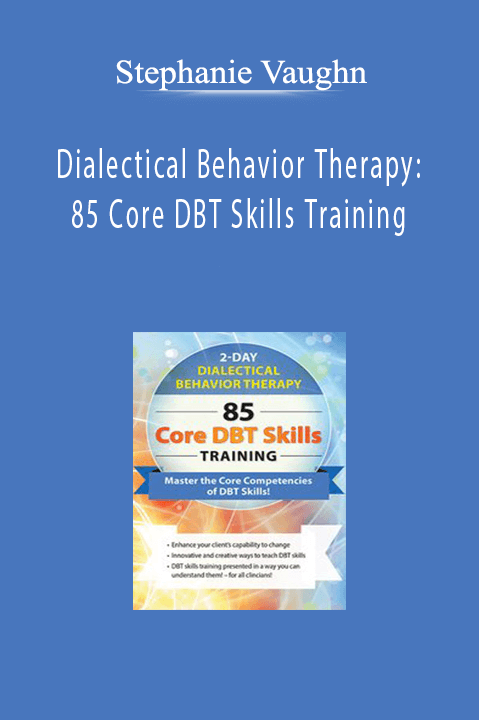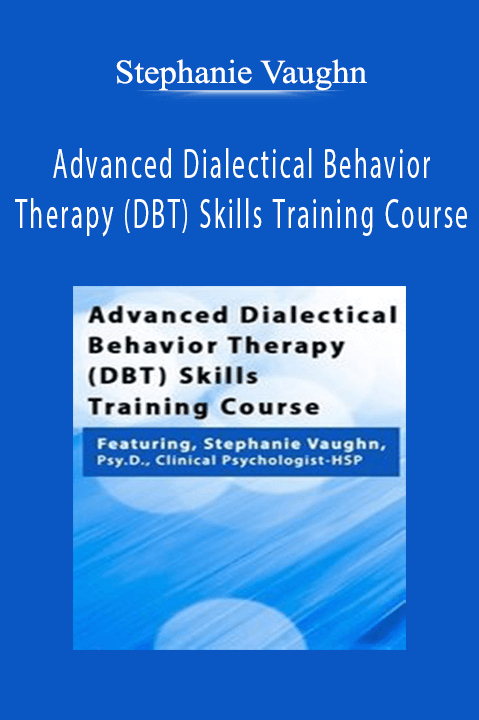Dialectical Behavior Therapy: For Clients – Stephanie Vaughn
Designed in the early 1990s, Dialectical Behavior Therapy (DBT) gives hope and confidence to clinicians and clients alike. DBT was originally used to treat chronic suicidal individuals. However, clinicians across the country are using DBT to help treat individuals with a wide range of mental illnesses including but not limited to Borderline Personality Disorder, eating disorders, and addictions.
This seminar recording is designed to help you understand why DBT is so effective with your clients and how it works with borderline personality disorder and other mental health disorders. You will also have a solid foundation in DBT through training. Speaker Dr. Stephanie Vaughn will help you demystify topics related to DBT and borderline personality disorder.
Known as a third-wave therapy, DBT moves away from the strict change strategies found in traditional treatments. In DBT, the therapist and the client balance these traditional change strategies with acceptance and mindfulness. It’s the constant back and forth movement between acceptance and change that makes DBT unique.
- Articulate the theories of DBT and their importance.
- Assess the 5 Modes and Functions of DBT Treatment.
- Utilize the Stages of Treatment in DBT in your practice.
- Utilize a variety of DBT skills for treating mental health symptoms, chemical dependency and complex co-morbidity.
- Teach DBT skills in the areas of Mindfulness, Distress Tolerance, Emotional Regulation and Interpersonal Effectiveness.
- Articulate a variety of strategies for teaching DBT skills to clients.
Overview of DBT
- Why Dialectics and what does that mean anyway?
- Common “Dialectical Dilemmas” of clients with Borderline Personality Disorder
- Borderline Personality Disorder Defined and Re-Defined
- Biosocial Theory of Borderline Personality Disorder… Etiology and why we need to know it
- Engendering compassion and empathy for this “difficult-to-treat” population
- Current research on DBT and why it is important to know it
Modes and Functions of DBT
- Individual Therapy — enhancing motivation
- Telephone Consultation — enhancing generalization
- DBT Consultation Group — enhancing motivation & skill of the therapist
- Skills Training — enhancing capabilities
- Ancillary Treatments — structuring the environment
Stages and Targets of DBT — Structuring the Treatment
- Pre-Treatment Stage: Orienting the client to treatment and getting commitment
- Stage 1 Target Behaviors: Decrease life-threatening, therapy interfering and quality of life interfering behaviors and increase DBT skills
- Stage 2 Target Behavior: Decrease posttraumatic stress responses
- Stage 3 Target Behavior: Increase self-respect and achieve individual goals
- Stage 4 Target Behavior: Increase joy, freedom and spiritual fulfillment
- Targeting Strategies…What to treat and when
The Diary Card
- How to teach a client to fill out a diary card
- Review a diary card in an individual therapy session
- Where to look and what to treat on a diary card
DBT Skills Training
- Demographics and structure of the DBT Skills Training Group
- Rules of DBT Skills Training Group
- Targets of DBT Skills Training Group
- Roles of facilitators
Core Mindfulness Skills
- The “Core” Skills in DBT Skills Training
- Become more mindful of thoughts, feelings and urges and acting with intuition
- Decrease the amount of judgments clients make about themselves and others
- Participating and “throwing yourself in” (with a Wise Mind of course)
Distress Tolerance Skills
- Tolerate and survive a crisis (without making it worse)
- “Distract” themselves in their attempts to regulate their emotions
- Self-Soothing the five senses in times of a crisis
- “Radically Accepting” the crisis as it is and letting go of the struggle
Interpersonal Effectiveness Skills
- Skills to help clients make requests and say NO (and have it stick)
- Teaching clients how to improve and attend to relationships
- Self-Respect in the client and the respect others have for them
Emotion Regulation Skills
- Regulate or even change intense emotions
- Decrease emotional vulnerability in your client
- Decrease negative emotions and increase the positive (and staying mindful of them)
- “Building a Life Worth Living”
Please Note: PESI is not affiliated or associated with Marsha M. Linehan, PhD, ABPP, or her organizations.
GET DIALECTICAL BEHAVIOR THERAPY: FOR CLIENTS OF AUTHOR STEPHANIE VAUGH
Instant Access Available
Product Content

Get Instant Access Dialectical Behavior Therapy: For Clients – Stephanie Vaughn at Offimc.click Now!
Delivery Information
- Upon ordering the product, a delivery email with download instructions will be sent immediately to you so that you may download your files. If you log in (or create an account) prior to purchase you will also be able to access your downloads from your account dashboard.
- It is a digital download, so please download the order items and save them to your hard drive. In case the link is broken for any reason, please contact us and we will resend the new download link to you.
- If you don't receive the download link, please don’t worry about that. We will update and notify you as soon as possible from 8:00 AM – 8:00 PM (UTC+8).
- Please Contact Us if there are any further questions or concerns you may have. We are always happy to assist!










11 reviews for Stephanie Vaughn – Dialectical Behavior Therapy: For Clients
There are no reviews yet.